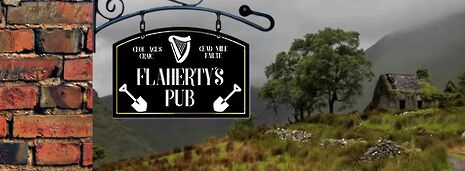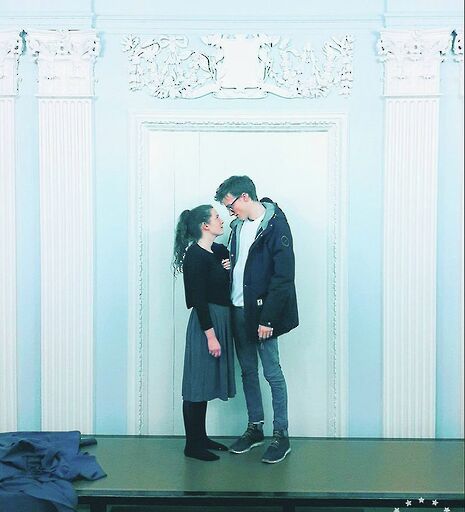Review: The Playboy of the Western World
Katie Woods is impressed by the concoction of the one-part poetic darkness to two-parts cheeky, cider-fuelled charm of this classic Irish play

The Playboy of the Western World is no easy play to direct. Finding the right line between emphasising either the darker themes of the script and the comedic overtone is undoubtedly a hard balance to strike. Combine this with the poetic framework of the language, and the challenge of teaching Irish accents in a just few weeks and it’s clear to see that Eimear Ryan-Charleton had a tough job on her hands.
“It’s not clear whether you’re watching a play or you’ve made a trip to the local with a group of friends”
But it is one, I’m glad to say, that was thoroughly pulled off. Rumours of Pembroke’s New Cellars being turned into a pub did not disappoint. As soon as you walked in you were greeted by slurred singing of Irish classics, ushered to sit at tables and chairs grouped together in little clusters with the option of free cider, and, as you “take your seat”, it’s not clear whether you’re watching a play or you’ve made a trip to the local with a group of friends. A brilliantly innovative idea that fully immersed the audience into rural Ireland: the scene was set for the drama in Flaherty’s pub to unfold.
Much like the audience, Christy Mahon (Todd Gillespie) stumbles into the tavern, claiming that he’s on the run because he killed his own father. Oddly, the residents warm to Christy, praising his confidence and it’s not long before the whole town falls in love with him, but most importantly Flaherty’s daughter (Niamh Curran) who promises to leave her betrothed, until Mahon proves not to be all that he seems.

Todd Gillespie is excellent as the playboy, convincingly switching from the self-assured hero the townsfolk set him up to be, and the cowardly fallen man he leaves the play as. Niamh Curran is confident and feisty as the quick-witted Pegeen, whilst also providing moments of poignancy and pain towards the end of the play. In fact, all members of the cast were skilled at delivering lines that would have the audience laughing one minute, and feeling melancholic the next.
Nathaniel Hess, as the likeable but pathetic Shawn Keogh, got some of the biggest laughs of the play and the decision to keep Hess’ native English accent worked to present him as the outsider, making his character all the more hilariously tragic. James Mackay as the “not quite so dead after all” father of Christy, had one of the hardest jobs of all the cast – attempting to look like an elderly man who had survived two bloody attacks. A poor portrayal may have descended the character and therefore part of the plot into the ridiculous, but Mackay embodied a wholly believable physicality that added to the air of realism that the show was trying to create.
“The scenes were strongest when most of the cast were on stage: their energy infectious and the camaraderie obvious”
Each actor is deserving of individual praise, but the scenes were strongest when most of the cast were on stage. The dynamism and support they provided to psych each other up, particularly with the musical interludes, elevated slower moments of the play: their energy infectious and the camaraderie obvious.
Jack Benda’s set was impressive, with bottles of alcohol surrounding the cellars, a convincing construction of a bar and various bric-a-brac providing the perfect backdrop. But this is largely a play of dialogue, and the technical aspects were obviously not the focus of the production. Whilst the blocking was mainly concentrated on one side of the space, providing a poor view for audience members facing stage right, the pacing could at times feel a little slow, particularly at the start of Act 1. The accents, committed though they were, were occasionally hard to understand. But these were, on the whole, minor details that did not distract from the overall success of the play.
If you’re expecting to walk into the New Cellars for some black box theatre with a deep hidden meaning, this production is not for you. But if you’re looking for lively performances, exemplary acting, free alcohol, and possess the desire to sing Irish folk songs all the way home – then Playboy is thoroughly worth seeing. A production that does justice to the reputation of the play as an example of Irish theatre at its finest
 Interviews / ‘People just walk away’: the sense of exclusion felt by foundation year students19 April 2024
Interviews / ‘People just walk away’: the sense of exclusion felt by foundation year students19 April 2024 News / John’s spent over 17 times more on chapel choir than axed St John’s Voices22 April 2024
News / John’s spent over 17 times more on chapel choir than axed St John’s Voices22 April 2024 News / Corpus student left with dirty water for over six months21 April 2024
News / Corpus student left with dirty water for over six months21 April 2024 Theatre / The closest Cambridge comes to a Drama degree 19 April 2024
Theatre / The closest Cambridge comes to a Drama degree 19 April 2024 News / Copycat don caught again19 April 2024
News / Copycat don caught again19 April 2024





